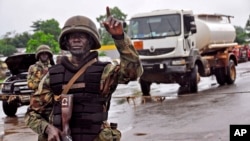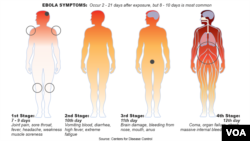Liberia and Sierra Leone are reporting hundreds of confirmed or suspected cases of Ebola.
With public health systems overrun, both countries have declared states of emergency and sent security forces to quarantine affected areas, setting up roadblocks and taking other measures to limit people's movements as part of the efforts to contain the spread of the deadly virus.
In Liberia, they are calling it "Operation White Shield."
Information Minister Lewis Brown says checkpoints are already being established.
"Unless it is absolutely necessary, individuals in all affected counties are strongly advised to remain in their counties and continue to take the necessary preventive measures announced by the health experts," he added.
Border region
The goal is to seal off at least four affected counties in the north and west of the country and the borders with Guinea and Sierra Leone.
Defense Minister Brownie Samukai says the soldiers "will have positions along the border to ensure that there is no further entry of any persons who may be suspected or for whatever health reasons is determined by those on the ground not to cross the border."
Health authorities say sick people and people who may have been exposed to the Ebola virus need to stop moving around and infecting new areas.
Both Sierra Leone and Liberia have security forces guarding Ebola treatment centers and health workers.
Sierra Leone sent its army to enforce what the government says will be a complete blockade of the Kenema and Kailahun districts on the country's eastern border with Liberia and Guinea.
A VOA reporter in Kenema says security forces are blocking cars from going in and out of affected areas there. Soldiers are also expected to start foot patrols.
Between the two of them, Liberia and Sierra Leone are setting out to monitor people's movements in and out of more than 16,000 square kilometers.
No cure
Ebola has no cure but about 40 percent of those infected in this outbreak are surviving with medical care. An infected person isn't contagious until the symptoms such as fever and vomiting begin. It can take up to three weeks for those symptoms to appear once a person catches the virus, either through bush meat or the bodily fluids of an Ebola patient.
So even if security forces succeed in sealing off the most affected zones in these two countries, the 21-day incubation period means that new cases could continue to crop up in coming weeks.
The Liberian government says security forces will extend quarantine measures to additional areas as needed.
The governments of both countries have warned citizens that things could get worse before they get better.
Prince Collins reported from Monrovia. Patrick Jakema reported from Kenema, Sierra Leone.







